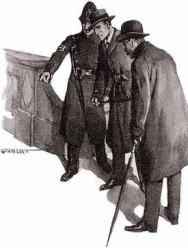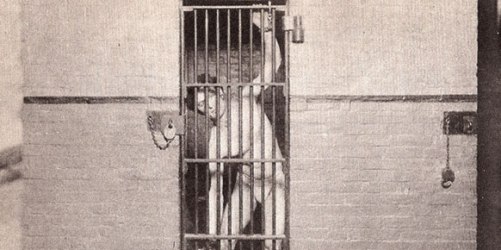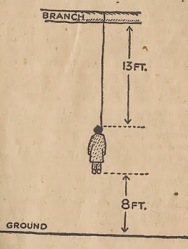This coming Tuesday sees the final instalment in my month-long look at Locked Room International’s multi-national impossible crime short story collection, and I thought I’d take this opportunity to address an oversight Puzzle Doctor, TomCat, and I have all been guilty of: the 12 real-life cases also contained within.
Covering a range from historical hearsay to personal experience, these quick little snippets of the impossible shown possible in everyday life (the longest runs to a page-and-a-half) are fascinating for two reasons — firstly in that it goes to underline just how such appearances actually can be achieved, and secondly because in a handful of cases there is as yet no solution to the problem as posed…so prepare for your mind to work overtime! I couldn’t quite decide on whether to take a Top 5, or a Most Alphabetical Seven, or even a Assign a Fictional Sleuth and Determine How They’d Solve It, so instead I’ll simply precis all of them and add whatever thoughts I have as I have them. This will result in more being said about some than others but, well, life is like that sometimes, hey?
So, with only this much extra ado, here we go:
1. Louis Calhern’s Weakness [solution provided]
I made reference to this in last Tuesday’s post: the story of an alcoholic actor who is locked in his meticulously-searched hotel room every night without any access to the booze that so blights his performances and yet is found blind drunk in the morning. This is one of those fun ones, where the answer is as enjoyable as the setup itself — in fact, there’s a chance Calhern may even have stolen it from a famous and well-regarded locked room novel, which simply makes it more delightful.
2. Moving Coffins [no solution provided]
Early 19th century Barbados is the fitting setting of this mystery of the coffins within a family vault being violently disturbed — flung across the sealed space, not merely shifted around a bit — without there being any way for them to have been moved. Echoes of a particular Jonathan Creek episode abound here, as do similarities with the Elizabeth Peters story in this very collection, but the additional difficulties of the tomb being opened repeatedly to this disarray and earthquakes and flooding ruled out give this an added piquancy. Answers on a postcard…
3. Bridge to Death [solution provided]
Cites the story referred to in S.S. van Dine’s The Greene Murder Case (1928) — which also gave rise to a Sherlock Holmes story — of a man found shot at close range on a bridge and the way this achieves an impossible aspect. Most interestingly, this then goes on to cite a more modern extrapolation of the same idea that may well have been gleaned from an episode of CSI: Crime Scene Investigation. For all its relative hoariness — even Father Brown stole this idea, though that’s not exactly a revelation — I still think there’s a great story to be told utilising this method. One has occurred to me, in fact, so maybe if LRI do another one of these collections I’ll see if I can replicate Pietro de Palma’s success and join the ranks of legit published short story writers.
 4. Death of the Empress Elisabeth [solution provided]
4. Death of the Empress Elisabeth [solution provided]
An inverted telling, this, which talks you through the commission of the crime and then goes on to explain how it may have seemed impossible. A method seen elsewhere — most recently that I’m aware of in one of the best episodes of Sherlock — that I still sort of love for its gimmickry. Be aware, too, that this telling of the tale spoils Georgette Heyer’s Envious Casca (1941), but in reality you’re being done a favour there — it’s not a good book, and you’re saving time cooped up with miserable, horrible people that could instead be spent familiarising yourself with Max Afford or E.C.R. Lorac.
5. Mass Murder in the Basement [solution provided]
I’m not a squeamish man by any measure, but this story of a mother and her children found dead in their cellar as a suspected murder-suicide is creepy and more than a little unsettling. Legitimate detection wins the day, and as methods go it seems the height of innovation for the late 19th century commission of the crime…but, man, it’s more than a little dark.
6. Houdini Defeated [solution provided]
If you wish to get technical, this isn’t an impossibility at all. But I am delighted to learn that what I thought was an apocryphal story about Harry Houdini being locked in a prison cell and unable to crack the lock on the door is in fact true. That’s all I have to say, really, except that the disappointing impossible crime novel The Dime Museum Murders (1999) by Daniel Stashower ends with a different imagining of a similar event, which may be where my confusion comes from.

7. The Impossible Theft of 1,000 Rare Books [solution provided]
The setup here is simply too tantalising — an old monastery, a library filled with rare tomes that can only be reached through a single locked door at the end of a guarded passage, books that keep going missing nonetheless. The locks are changed, twice, to no avail. The room is searched over and over again, to no avail. Books keep vanishing… The solution is, as so often happens in real life, rather prosaic, but weirdly historically fitting at the same time. I would love someone with more creativity than I to turn this into a novel and stir in a ghost and some impossible murders, too…provided they come up with a better solution to this book vanishing, that is.
8. Murder on the Metro [no solution provided]
This is enough to get even the most jaded and cynical armchair detective to sit up and start sketching crime scene plans: passengers entering a train on the Paris metro flood into an empty carriage from the doors at either end…only to discover a body that has only just been stabbed sitting alone in the middle of the coach. Very little blood has yet been spilled, the weapon is still in evidence, the crowds barging in at either end would have made the murderer plainly visible…howdunnit? And, yes, of course suicide was ruled out — we’re not in the 19th century any more. Answers on a postcard once again…
9. Hanged Too High [solution provided]
The central impossible hanging is now familiar to folk as a sort of thought experiment, but no less interesting for that. What is compelling is the context surrounding this hanging — sure, the litany of events described herein could easily be attributed to a run of quit astounding bad luck, but the idea of this whole things being stage-managed by some elaborate Machiavellian genius behind the scenes is too tempting to ignore. Doubtless that’s just the fictional murder nerd in me getting carried away, though. Also recalls one of the better Lord Darcy short stories by Randall Garrett, though the solution here is very different to that one.

This is not from either.

Hey, I did mention that they were in the book… but I have to take issue with the Edward II one, and not just because the book fails to take advantage of the opportunity to mention Paul Doherty’s many locked room tales. He may have been murdered, he might not have been, but the dubious method of doing so has been discredited – anyone who thinks that nobody would notice that method of murder is rather mistaken. It simply isn’t an impossible crime in any way, shape or form.
LikeLiked by 1 person
Oh, well, there you go — I was unaware that this had been discredited, but it’s nice to know so thanks for correcting my misconception there.
Has Doherty written much in the way of short stories? Any short-form impossibilities of his that you’d recommend?
LikeLike
There are some, but probably a bit longer than most collections would prefer. Let me have a think about which the better ones are.
LikeLike
Many thanks 🙂
LikeLike
Well, I was about to re read them only to find that they’ve vanished from Amazon, apart from The Peacock’s Cry, which in really a novella. A shame… might re read them anyway
LikeLike
Regarding the moving coffins of Barbados , Conan Doyle gave a supernatural explanation which is detailed in his book The Edge Of The Unknown (Chapter 5 The Law of the Ghost).
It is strange that Conan Doyle who created the logical and rational detective Sherlock Holmes believed in supernatural stuff !
LikeLike
Conan Doyle got increasingly involved in the supernatural following the death of his son, didn’t he? I know he had a massive range of interests, and can sometimes feel his frustration at only being known for the Holmes stories…!
LikeLike
Doesn’t #2 refer also to a John Dickson Carr title, The Sleeping Sphinx? I don’t know many mysteries that contain moving coffins, but that’s one.
LikeLike
Yes. See Puzzle Doctor’s Post on the Sleeping Sphinx and J J Mcc’s and my comments there.
LikeLike
Couldn’t help you there, that’s one I’ve not got to yet. I have four editions of it, but am yet to actually sit down and read the damn thing (which is partly why I have four editions: I keep finding it and going “Ooo, I don’t have that!”…but I’ve learned my lesson now).
LikeLike
Here’s another real-life mystery:
How does Facebook know me or you well enough to recommend you (under your real name) as a friend when my Facebook account isn’t connected to my blog email address but my “real life” one? There is a link via WordPress as I use the blog email address there but post to my Facebook account, but that still seems like a level of sleuthing from the programs that I’m not keen on…
Basically, Facebook must spot my email address from the blogposts, then search through my email contacts in an account that it shouldn’t have the password to (the blog can post to Facebook, not vice versa), spot my emails to you under your real name and then presumably, link up to your blog to note the same interests. A bit worrying? Oh, and my privacy setting are all set to high, btw
LikeLiked by 1 person
That’s spooky, PD, but not as irritating as Facebook not suggesting you and me be friends!!! What am I, chopped liver??? Is it because I dare to blog under my real name? Is it because I’m short?!? I demand an explanation from FB – and it better not be fake news!
LikeLike
It is because you’re short, actually.
LikeLiked by 1 person
Equakky odd is Facebook recommending to me an ex-student as a friend with whom I have never shared any mutual friends, and who doesn’t have my personal email address in their contacts, and whose email address I don’t have either. Any suggestions welcome…!
LikeLike